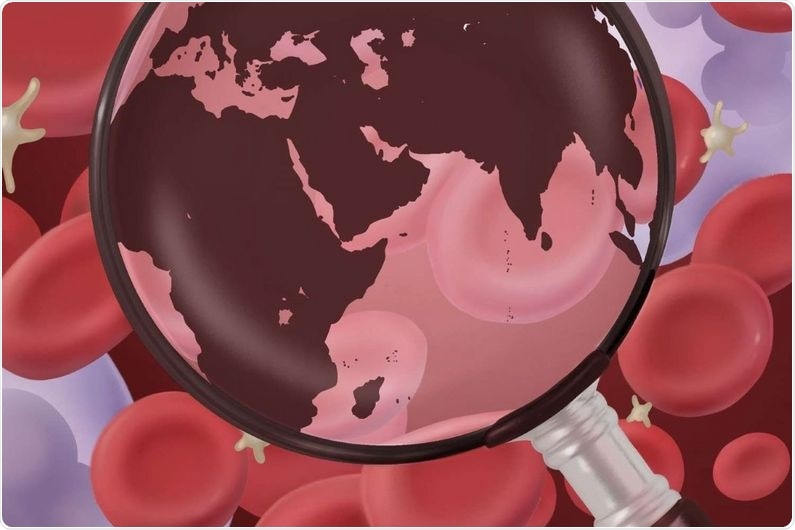A team of researchers, headed by Professor Guillaume Lettre from the University of Montreal, has established an international consortium to analyze the blood of scores of people across the globe. Their aim was to identify which kind of human populations might develop a disease.

Image Credit: Elizabeth Moss.
In one of the largest first-of-its kind studies published recently in the Cell journal, around 750,000 participants from five leading populations—African, European, Hispanic, South Asian, and East Asian—were examined to observe the impact of genetic mutations on features found in their blood. Such characteristics include things like platelet counts and hemoglobin concentration.
Each human population is subject to different environments. Over thousands of years, these environmental pressures have resulted in the progressive appearance of variations in DNA, called genetic mutations, which can influence our physical characteristics, such as skin size or color, but also our risk of getting certain diseases.”
Guillaume Lettre, Professor and Researcher, Montreal Heart Institute, University of Montreal
Guillaume Lettre continued, “This observation (of how the environment affects how people’s appearance and health vary in different parts of the world) represents the cornerstone of the theory of evolution by natural selection proposed by Charles Darwin in 1859.”
Established by Guillaume Lettre and his collaborators, the international consortium opted to investigate 15 traits of blood cells because earlier analyses had already disclosed the mutations, the results of which were restricted to specific populations.
45 million genetic mutations
Lettre and his collaborators identified over 5,000 mutations in human DNA by testing over 45 million genetic variations in every participant. These mutations influence the blood characteristics of human populations around the world.
The latest study, performed along with another study that focused mainly on people of European origin, demonstrates that the huge majority of mutations linked to blood cells were common to all five major groups of population.
However, apart from these, the team also observed around 100 mutations, the impact of which was limited to specific populations and which, it turns out, are not found in individuals of European descent.
For instance, in people of South Asian origin, a mutation was identified in the interleukin-7 gene that activates the secretion of this molecule and therefore boosts the concentrations of lymphocytes (a type of white blood cell found in the immune system) circulating in their blood.
Of course, this kind of mutation can affect the health of people of South Asian origin. It’s thought that this mutation could influence their capacity to resist certain infections or develop diseases like blood cancer.”
Guillaume Lettre, Professor and Researcher, Montreal Heart Institute, University of Montreal
But Lettre warned, “These are, at present, only hypotheses, as researchers do not have the capacity to test them, given the immense costs and the difficulty of finding participants for this type of study.”
Improving ways of predicting
When the researchers compared the genetic outcomes acquired in each population, they were able to prioritize specific genes that seem to have an overall impact on the production of blood cells.
Over time, this will allow the researchers to enhance the ways of estimating the risk of suffering from particular diseases and to develop novel and more effective treatments.
But here again, significant investments have to be made in research to examine the outcomes of these mutations on the health of these specific population groups.
Another major barrier will be to persuade scientists on the importance of including all population groups around the world in these types of genetic studies.
Despite the size of our study, the vast majority of participants—about 560,000 out of 740,000 individuals—were of European origin. This necessarily introduces a bias into the study.”
Guillaume Lettre, Professor and Researcher, Montreal Heart Institute, University of Montreal
In the days to come, “we hope to work with populations that have been little studied so far —for example, East African populations or indigenous peoples—in order to shed light on new genes that regulate blood cells,” he added.
But one thing is certain, to better interpret human diseases and to assure that everyone, irrespective of ethnic origin, is able to gain from advancements made in precision medicine and genetics, diseases will have to be explored in all populations globally, Lettre concluded.
Source:
Journal reference:
Chen, M.-H., et al. (2020) Trans-ethnic and Ancestry-Specific Blood-Cell Genetics in 746,667 Individuals from 5 Global Populations. Cell. doi.org/10.1016/j.cell.2020.06.045.